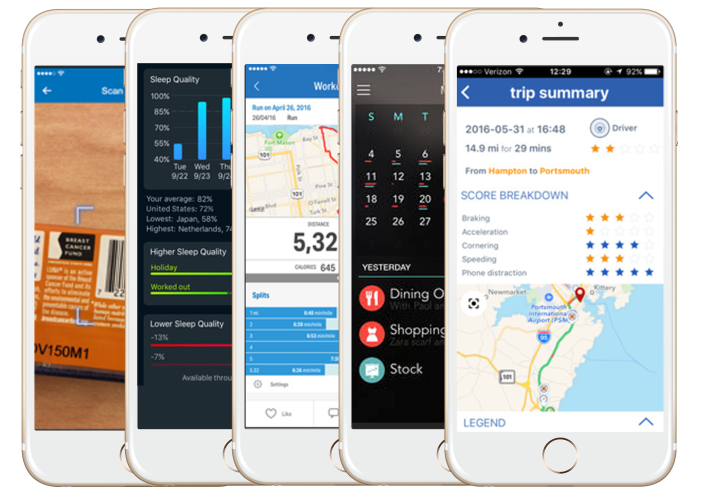5 Spheres of Daily Life You Can Now Track With Your Phone

The human mind is obsessed with measurement. In this digital age, tracking devices have exploded in number and variety. There are gadgets to wear, apps to download, sensors to keep near us. We track everything from how well we sleep to how we manage our spare change. Part of this obsession may derive from the very convenient nature of modern tracking. Today's devices allow us to find out information about ourselves and determine results without actually doing much work. Tracking ourselves has become so easy that there's now a term for the movement behind it: the "quantified self."
So, what do all of these numbers mean? To put it bluntly—what's the point? At the central core of these metrics is self-knowledge. While we may have our own reasons for self-tracking, all of these measurements lead to results, and in turn, these self-trackers offer us accountability. They track daily occurrences and analyze metrics to help improve our quality of life. They allow us to make changes, monitor improvements and collect information. They can help us become a better sleeper, a faster runner or a healthier eater. They amplify our drive and create motivation.
Considering 70% of adults track a health indicator for themselves in some form, it's no wonder that these devices have taken off in the past few years. Users of self-trackers can't deny the numbers in front of them and therefore, these trackers have the potential to offer valuable self-insight.
Here are 5 areas of your daily life you can now measure and couldn't before:
1. Food Trackers
Mobile apps like MyFitnessPal and Lose It! allow users to log their food and track calorie intake. Users can even record water intake and enter height and weight loss goals to receive personalized calorie suggestions. You can input all food or drinks consumed daily and view a nutritional breakdown to see areas for improvement. Both apps also allow you to connect with friends to challenge each other to eat healthier.
2. Driving Apps
Your driving probably hasn't been tracked since the day you passed your road test. Yet with all the accidents on the roads, we could use better drivers. There are now safe driving apps available for those looking to monitor their road skills in a fun way. One app, EverDrive, measures the drives you take and gives you a trip score based on metrics that include speeding, acceleration, harsh turns, braking use, and distracted driving. Users can also compete with friends and look at tips to improve their driving skills. Other apps like Fuel Buddy and Mileage Keeper help monitor mileage and fuel economy as you drive so you can save money on gas.
3. Money and Personal Finance
With all of these modes of self-tracking, we can't forget about the importance of personal finance. There are now several apps available to help you keep track of your money. Mint manages all of your personal finance and allows you to input budgets, bills and savings goals. Other apps like Level Money help you track your spending habits while Spendbook records income, expenses, and offers a calendar view to browse past spending.
4. Sleep Cycles
People have always been curious about what happens during sleeping hours. What was once reserved for sleep clinics, is now available in a similar format with a quick smartphone download. Track your REM and sleep stages to see how many hours a night you're sleeping. The app Sleep Cycle works as an alarm clock that tracks your sleeping patterns to wake you up during the lightest sleep. Another app, Beddit gathers data on sleep quality, duration, heart rate and respiration rate. There are also alarm clocks with sensors, like the Withings Aura, that link to an app so you can view patterns and improve sleep quality.
5. Daily Activity and Exercise
Athletes have been tracking their distances and speeds for decades, but until recently, it wasn't as common for the general public to track daily activity with so many metrics. Now there's an abundance of apps and devices for those looking to exercise more, lose weight or monitor fitness. The most well known is likely Fitbit, which can be used to track data about steps taken, heart rate and calorie burn. Other options for users include MapMyRun, the Microsoft Band, Runkeeper and Garmin wearables.
In this Information Era, we've turned to quantifying ourselves for improvement. We seek the measurements, the numbers and results. We hope they'll make us more productive and change our behavior. Now there are five areas of your daily life that you can monitor and improve upon. Go ahead, and track yourself closer to your goals.
